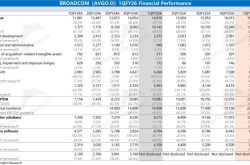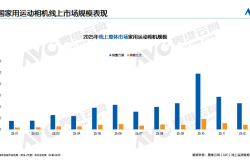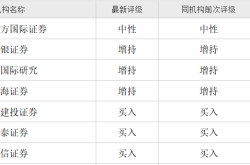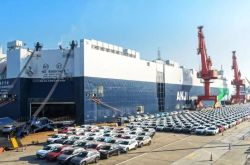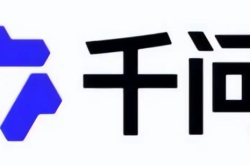Who still remembers Maserati?
![]() 10/29 2024
10/29 2024
![]() 469
469
Survival crisis
How long has it been since you last heard about Maserati? The last hot topic about Maserati seemed to be "WeChat business owners happily taking delivery of their new Maserati". In the past two years, most of the attention in China's passenger vehicle market has been focused on the "epic battles" among automakers. Although there have been occasional reports of a cooling luxury market, they have not attracted significant attention. However, recent news has come as a bit of a surprise: the long-silent Maserati is apparently facing a survival crisis?
On October 16, Carlos Tavares, CEO of the Stellantis Group, publicly acknowledged at the 2024 Paris Motor Show that the Maserati brand, a subsidiary of the group, is facing financial difficulties and is operating at a loss. According to data released by the China Automobile Dealers Association Passenger Car Market Information Joint Council (hereinafter referred to as "CADA"), in 2023, Maserati sold 4,264 imported vehicles in the Chinese market, a year-on-year decline of 12%; from January to August 2024, Maserati sold a total of 840 imported vehicles in the Chinese market, a year-on-year decline of 74%.
In the view of Carlos Tavares, CEO of Stellantis, "there is nothing wrong with our products," but rather the brand positioning is unclear. He emphasized that Maserati is not just a sports car brand but also represents luxurious travel, high-quality living, sweet life, and technology. In Tavares' opinion, the previous management team of Maserati failed to convey this brand concept. Precisely because of this "terrible marketing," its sales in the first half of 2024 declined by more than 50%.
As a result, there have been changes in the heads of Maserati in various regions, including the newly appointed General Manager of China. But is the problem really in marketing? Judging from the situation in the Chinese market, from January to August this year, in addition to Maserati's steep 70% decline, McLaren even plunged by 80%. Furthermore, ultra-luxury brands such as Bentley, Rolls-Royce, Ferrari, and Lamborghini have all experienced varying degrees of decline. Amid the trend of intelligent and electric vehicles and the shrinking demand for luxury goods, ultra-luxury brands are facing unprecedented turmoil.
Consecutive declines
In fact, Maserati's decline did not start only in the past two years. As early as 2018, Maserati's sales in China had already shown a downward trend. Maserati entered the Chinese market in 2004 and experienced a period of rapid growth in 2011. In 2017, the Chinese market surpassed the US market to become Maserati's largest single market globally.
Data shows that in 2017, Maserati sold a total of 48,700 vehicles globally, an increase of 21% year-on-year. Sales in China amounted to 14,498 vehicles, an increase of 18% year-on-year, accounting for 29.8% of Maserati's global sales. How popular Maserati once was can be illustrated by a popular internet meme at the time: A WeChat business owner who hadn't "happily taken delivery" of a Maserati wasn't considered a successful one. This trend even spawned a new business, with some stores advertising, "Welcome WeChat business owners to take photos, 200 yuan per session."
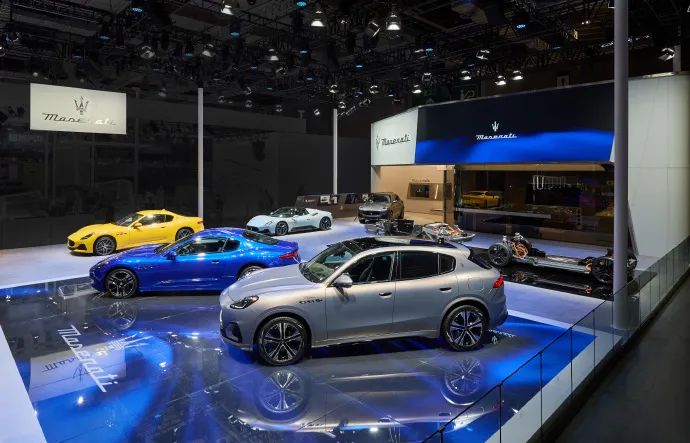
Image source: Maserati
However, after the boom in 2017, the good momentum did not continue. In 2018, Maserati sold only 10,696 vehicles in China, a year-on-year decline of approximately 30%.
Industry insiders generally believe that one of the most direct reasons for Maserati's continued sharp decline in sales since 2018 is the adjustment of China's tariffs. The reduction in tariffs triggered some market uncertainty, leading to the postponement of some June orders to July for delivery. In the second quarter of 2018, Maserati sold 1,500 vehicles in China, a year-on-year plunge of 70%.
Unfortunately, the gloom did not dissipate with the end of 2018, and Maserati's decline did not improve in 2019. Data shows that in 2019, Maserati sold 6,240 vehicles in China, a year-on-year decline of 42%; 4,787 vehicles in 2020; and in 2021, Maserati experienced a brief reversal, selling 7,143 vehicles in China, a year-on-year increase of 49%. Sales then plunged again in 2022, with 4,855 vehicles sold, a year-on-year decline of 32%; in 2023, Maserati sold 4,264 vehicles in China, a year-on-year decline of 12%. From January to August 2024, Maserati sold a total of 840 imported vehicles in the Chinese market, a year-on-year decline of 74%.
Maserati's presence in the ultra-luxury car market is becoming increasingly faint.
'If I hadn't searched online for reviews of Porsche models, I wouldn't have remembered that Maserati even existed,' said Wang Gang (a pseudonym), a car owner who had once planned to buy a car, on a social media platform. He said he only rediscovered the Maserati brand when it was recommended as a competitor model on the platform.
Wang Gang is not alone in his impression. In recent years, Maserati's presence in China has been minimal. This may also be what Tavares referred to as "terrible marketing." Of course, Maserati's decline is multifaceted, encompassing not only marketing issues but also complex factors related to its products and the current environment.
On September 25, Maserati announced that Hanbang Yu had been appointed as the brand's new General Manager for China, responsible for the business operations of the Trident brand in China. Davide Grasso, CEO of Maserati, has high hopes for Yu, stating that he has a deep understanding of the Chinese market and that "the Trident brand will continue to deepen its operations in China under his leadership and strive to achieve new milestones in development."
In addition to the change in leadership, Maserati has also launched some new vehicles. This year, Maserati has successively unveiled models such as the GranCabrio Trofeo, GranCabrio Folgore, and GT2 Stradale. In terms of new energy vehicles, according to the plan, all Maserati models will offer fully electric versions by 2025, and by 2028, the entire Maserati range will run solely on electricity.
Collective slowdown
When Maserati's sales declined in China in 2018, ultra-luxury brands such as Bentley, Lamborghini, Rolls-Royce, and McLaren could not relate to its plight and even continued to see rising sales in China. However, since the beginning of this year, these brands have collectively experienced a "cold winter" in China. From January to August, sales of Bentley, Ferrari, Rolls-Royce, Lamborghini, Aston Martin, McLaren, and other brands in the Chinese market declined by double digits, with McLaren experiencing a staggering 88% decline.
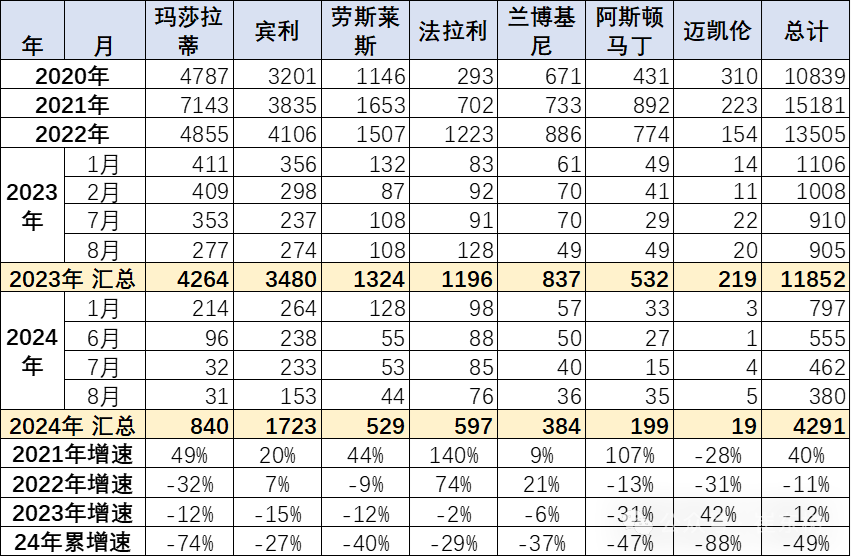
Image source: CUI Dongshu, CADA
'Imports of ultra-luxury vehicles have continued to grow in recent years, but there has been a 12% decline since 2023, with an accelerated decline from January to August 2024,' said CUI Dongshu, Secretary-General of CADA. The overall weakness in the ultra-luxury segment reflects a temporary slowdown in purchasing power among ultra-high-end consumers or a shift towards domestic high-end products.
In fact, to reverse declining sales, ultra-luxury vehicles have even unusually "participated" in price wars this year. In July, it was reported by dealer sources that the current five-seater Rolls-Royce Cullinan offered comprehensive discounts exceeding one million yuan in some regions; the 2024 Bentley Flying Spur 4.0T V8 Azure Edition was discounted by 700,000 yuan; and the Porsche Macan offered comprehensive discounts exceeding 20%, with cash discounts exceeding 100,000 yuan. Although some dealers explained that these prices did not represent the base price of the vehicles but rather discounts on options and personalization, the significant reduction in the cost of purchasing these vehicles is undeniable. 'The sales performance of ultra-luxury vehicles is closely related to the market economic environment and business cycle,' it was stated.
In an interview at the 2024 Chengdu Auto Show, Robin Collyns, Executive General Manager of Bentley Motors for Mainland China, Hong Kong, and Macau, said that taking 2021 and 2022 as examples, the ultra-luxury car market was at its peak in sales during these two years, and Bentley Motors also set sales records in China. He attributed this to the post-pandemic economic recovery in China, where consumers gradually resumed car purchases and other spending, leading to an increase in ultra-luxury car sales in line with market trends at the time. Nowadays, with fluctuations in the economic situation, market demand also fluctuates accordingly.
In Collyns' view, although sales this year have declined compared to the same period last year, Bentley has observed relatively positive market trends and remains optimistic about its sales performance in China this year. Amid the electrification and intelligent transformation of the automotive industry, ultra-luxury brands are also actively embracing change.
Currently, Rolls-Royce offers only one new energy product on sale, the Spectre, which is also its first fully electric model. According to previous plans, all Rolls-Royce models will be fully electric by 2030.

